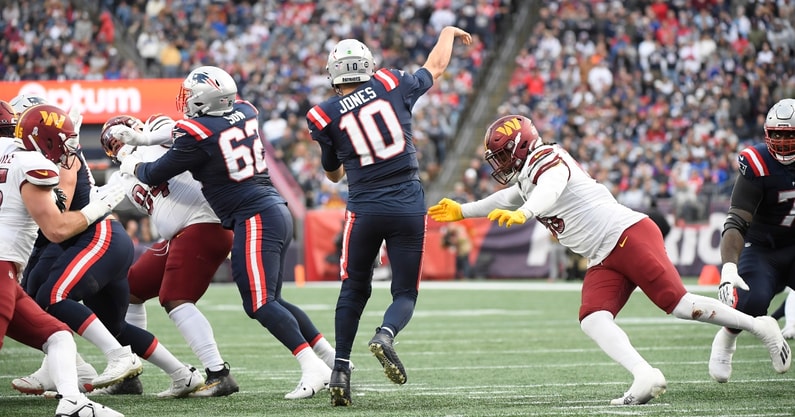Commanders-Patriots referee Adrian Hill explains controversial roughing the passer penalty on KJ Henry

One of the worst roughing the passer calls in the history of football was flagged on Sunday. The official who penalized Commanders defensive end KJ Henry for the hit on Patriots quarterback Mac Jones explained his call.
Henry sacked Jones on a third-down play in the third quarter of Sunday’s contest. But instead of a fourth down, official Adrian Hill threw a penalty flag on the defensive end for roughing the passer.
Everyone was incredibly confused, taking to social media to rip the call. And, in case you missed it, here was how it went down:
Top 10
- 1Breaking
Bryant Wesco injury
Dabo Swinney reveals severity
- 2New
Mike Elko
Shreds media over PSU question
- 3
Steve Sarkisian
Addresses play-calling duties
- 4Hot
DJ Lagway
Addresses his future at Florida
- 5
Heisman Trophy Poll
Big shakeup in Top 10
Get the Daily On3 Newsletter in your inbox every morning
By clicking "Subscribe to Newsletter", I agree to On3's Privacy Notice, Terms, and use of my personal information described therein.
Following the game, Hill explained why he threw a flag on the play.
“I was the calling official and the call was roughing the passer due to full body weight,” Henry said, per Pro Football Talk. “The ruling on the field was that the defender came down with forceable contact, chest-to-chest. He didn’t perform one of those acts to remove most of that body weight – a gator roll or a clear to the side when he was coming in. He came down directly with that force on the player, so the category was full body weight.”
Hill was then asked how a defensive player should handle that situation.
“There are two common techniques,” Hill said. “One we call the ‘gator roll’ where if he takes that player and rolls to the side so they both land on their side, that 90-degree rotation as he comes around. Or he comes down and breaks the fall first with hands and knees almost like in a crab-like fashion on top of the quarterback.”
I guess that is the explanation we have to live with. We don’t have to like it, though.